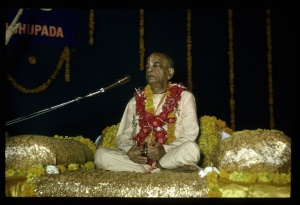SB 4.24.1: Difference between revisions
m (1 revision(s)) |
(Vanibot #0018 edit: make synonym terms in Sanskrit italic in SB - Vanisource) |
||
| Line 1: | Line 1: | ||
{{info | {{info | ||
|speaker=Maitreya | |speaker=Maitreya Ṛṣi | ||
|listener=Vidura | |listener=Vidura | ||
}} | }} | ||
[[Category:Srimad-Bhagavatam - Canto 04 Chapter 24|s01 ]] | |||
[[Category:Bhagavatam Verses Spoken by Maitreya Rsi - Vanisource|042401]] | |||
<div style="float:left">'''[[Srimad-Bhagavatam]] - [[SB 4|Fourth Canto]] - [[SB 4.24: Chanting the Song Sung by Lord Siva|Chapter 24: Chanting the Song Sung by Lord Śiva]]'''</div> | |||
<div style="float:right">[[File:Go-previous.png|link=SB 4.23.39]] '''[[SB 4.23.39]] - [[SB 4.24.2]]''' [[File:Go-next.png|link=SB 4.24.2]]</div> | |||
{{RandomImage}} | |||
==== TEXT 1 ==== | ==== TEXT 1 ==== | ||
<div | <div class="verse"> | ||
maitreya uvāca | :maitreya uvāca | ||
vijitāśvo 'dhirājāsīt | :vijitāśvo 'dhirājāsīt | ||
pṛthu-putraḥ pṛthu-śravāḥ | :pṛthu-putraḥ pṛthu-śravāḥ | ||
yavīyobhyo 'dadāt kāṣṭhā | :yavīyobhyo 'dadāt kāṣṭhā | ||
bhrātṛbhyo bhrātṛ-vatsalaḥ | :bhrātṛbhyo bhrātṛ-vatsalaḥ | ||
</div> | </div> | ||
| Line 17: | Line 23: | ||
==== SYNONYMS ==== | ==== SYNONYMS ==== | ||
<div | <div class="synonyms"> | ||
maitreyaḥ | ''maitreyaḥ uvāca''—Maitreya continued to speak; ''vijitāśvaḥ''—of the name Vijitāśva; ''adhirājā''—the emperor; ''āsīt''—became; ''pṛthu-putraḥ''—the son of Mahārāja Pṛthu; ''pṛthu-śravāḥ''—of great activities; ''yavīyobhyaḥ''—unto the younger brothers; ''adadāt''—offered; ''kāṣṭhāḥ''—different directions; ''bhrātṛbhyaḥ''—unto the brothers; ''bhrātṛ-vatsalaḥ''—very affectionate to the brothers. | ||
</div> | </div> | ||
| Line 24: | Line 30: | ||
==== TRANSLATION ==== | ==== TRANSLATION ==== | ||
<div | <div class="translation"> | ||
The great sage Maitreya continued: Vijitāśva, the eldest son of Mahārāja Pṛthu, who had a reputation like his father's, became emperor and gave his younger brothers different directions of the world to govern, for he was very affectionate toward his brothers. | The great sage Maitreya continued: Vijitāśva, the eldest son of Mahārāja Pṛthu, who had a reputation like his father's, became emperor and gave his younger brothers different directions of the world to govern, for he was very affectionate toward his brothers. | ||
</div> | </div> | ||
| Line 31: | Line 37: | ||
==== PURPORT ==== | ==== PURPORT ==== | ||
<div | <div class="purport"> | ||
After describing the life and character of Mahārāja Pṛthu in the previous chapter, the great sage Maitreya began to speak about the sons and grandsons in the genealogical line of the Pṛthu dynasty. After the death of Mahārāja Pṛthu, his eldest son, Vijitāśva, became emperor of the world. King Vijitāśva was very affectionate toward his younger brothers, and therefore he wanted them to rule different directions of the world. From time immemorial the eldest son generally becomes king after the death of the previous king. When the Pāṇḍavas ruled the earth, Mahārāja Yudhiṣṭhira, the eldest son of King Pāṇḍu, became emperor, and his younger brothers assisted him. Similarly, King Vijitāśva's younger brothers were appointed to govern the different directions of the world. | After describing the life and character of Mahārāja Pṛthu in the previous chapter, the great sage Maitreya began to speak about the sons and grandsons in the genealogical line of the Pṛthu dynasty. After the death of Mahārāja Pṛthu, his eldest son, Vijitāśva, became emperor of the world. King Vijitāśva was very affectionate toward his younger brothers, and therefore he wanted them to rule different directions of the world. From time immemorial the eldest son generally becomes king after the death of the previous king. When the Pāṇḍavas ruled the earth, Mahārāja Yudhiṣṭhira, the eldest son of King Pāṇḍu, became emperor, and his younger brothers assisted him. Similarly, King Vijitāśva's younger brothers were appointed to govern the different directions of the world. | ||
</div> | </div> | ||
__NOTOC__ | |||
<div style="float:right; clear:both;">[[File:Go-previous.png|link=SB 4.23.39]] '''[[SB 4.23.39]] - [[SB 4.24.2]]''' [[File:Go-next.png|link=SB 4.24.2]]</div> | |||
__NOTOC__ | |||
__NOEDITSECTION__ | |||
Revision as of 23:11, 30 November 2017

A.C. Bhaktivedanta Swami Prabhupada
TEXT 1
- maitreya uvāca
- vijitāśvo 'dhirājāsīt
- pṛthu-putraḥ pṛthu-śravāḥ
- yavīyobhyo 'dadāt kāṣṭhā
- bhrātṛbhyo bhrātṛ-vatsalaḥ
SYNONYMS
maitreyaḥ uvāca—Maitreya continued to speak; vijitāśvaḥ—of the name Vijitāśva; adhirājā—the emperor; āsīt—became; pṛthu-putraḥ—the son of Mahārāja Pṛthu; pṛthu-śravāḥ—of great activities; yavīyobhyaḥ—unto the younger brothers; adadāt—offered; kāṣṭhāḥ—different directions; bhrātṛbhyaḥ—unto the brothers; bhrātṛ-vatsalaḥ—very affectionate to the brothers.
TRANSLATION
The great sage Maitreya continued: Vijitāśva, the eldest son of Mahārāja Pṛthu, who had a reputation like his father's, became emperor and gave his younger brothers different directions of the world to govern, for he was very affectionate toward his brothers.
PURPORT
After describing the life and character of Mahārāja Pṛthu in the previous chapter, the great sage Maitreya began to speak about the sons and grandsons in the genealogical line of the Pṛthu dynasty. After the death of Mahārāja Pṛthu, his eldest son, Vijitāśva, became emperor of the world. King Vijitāśva was very affectionate toward his younger brothers, and therefore he wanted them to rule different directions of the world. From time immemorial the eldest son generally becomes king after the death of the previous king. When the Pāṇḍavas ruled the earth, Mahārāja Yudhiṣṭhira, the eldest son of King Pāṇḍu, became emperor, and his younger brothers assisted him. Similarly, King Vijitāśva's younger brothers were appointed to govern the different directions of the world.